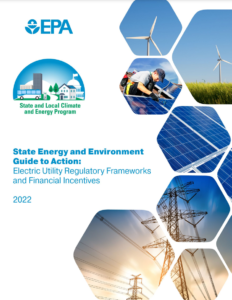Full Title: State Energy and Environment Guide to Action: Electric Utility Regulatory Frameworks and Financial Incentives
Author(s): Environmental Protection Agency
Publisher(s): Environmental Protection Agency
Publication Date: August 20, 2022
Full Text: Download Resource
Description (excerpt):
Electric utility regulatory frameworks and financial incentives can address barriers to energy efficiency, renewable energy, and distributed energy resources (DERs) that are inherent in traditional utility regulatory models. Legislatures and electric utility regulators (often called public utility commissions) in many states are refining or replacing traditional utility financial policies to encourage utility actions and programs aligned with state policy goals. These states are adopting regulatory frameworks and financial incentives including revenue decoupling, multi-year rate plans (MYRPs), performance-based regulation (PBR), and performance incentive mechanisms (PIMs).
This chapter discusses state utility regulatory policies and financial incentives that address the throughput incentive and capital bias. This chapter also highlights states’ use of regulatory frameworks to successfully remove these disincentives for investment in DERs and reward utilities for achievements in system operations, energy services, clean energy goals, grid resilience and other objectives aligned with policy goals. This chapter describes revenue decoupling, which removes the link between electricity sales and revenue, and is considered a best practice for eliminating the throughput incentive.
